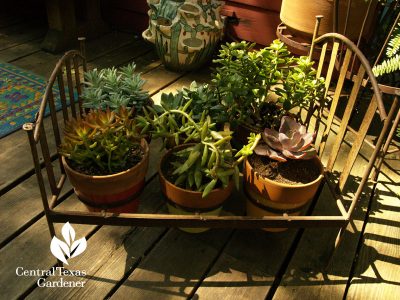Fertilizing Your Container Gardens

by Trisha Shirey
Fertilizing Your Container Gardens
Plants in pots are dependent on the gardener for their nutrients once they have depleted the nutrient reserve in the potting soil. Frequent or daily watering required when temperatures are high washes nutrients out of the containers. Salt based chemical fertilizers can actually burn plant roots and build up salt residue in the soils and pots. If you have noticed white salty looking crusts on your soil or on the outside of your pots, those are from chemical fertilizers.
For healthier plants without salt buildup, there are many organic ways to feed your plants.
Seaweed
Seaweed has over 70 trace minerals, several growth hormones and beneficial enzymes for plants
Amount: 1 teaspoon per gallon of water.
Purchase seaweed in powdered form and mix it with water for the most economical way to feed your plants.
Apple Cider Vinegar
Look for natural cider, derived from apples. It keeps houseplants looking good and deep green. It helps to neutralize the highly alkaline water that we have in Central Texas. Acetic acid in vinegar makes minerals in soil more available to plants. It also adds Potassium, phosphorus, calcium, magnesium and iron.
Amount: 2 tablespoons to a gallon of water. Use every time you water.
Molasses
Blackstrap is the best. It adds potassium, sulfur, iron, and magnesium. It also provides carbohydrates to stimulate beneficial microbes in soil and can be a deterrent to ants in pots.
Amount: 1-3 teaspoons per gallon.
Superthrive
One drop per gallon can help with drought stressed plants. It stimulates root growth and can help with making cuttings.
Compost
As a top dressing, compost provides microbes and retains moisture. It also feeds plants each time you water. Use inch to two inches on the top of soil. Avoid placing near the stem or trunks of plants to reduce rot issues. Leave one to two inches of space at the top of containers so that there is room to fill the pots with sufficient water.
Earthworm castings
This natural product provides gentle nutrients and insulates plants. There is no odor, so it’s great for houseplants.
Amount: Add several inches of mulch on top of compost or earthworm castings to further retain moisture.
Coffee grounds and tea leaves
Provide nitrogen and reduce pH slightly. Roses, gardenias and citrus plants thrive on coffee grounds added to their containers.
Use fresh or dried grounds. Brew a tea with old coffee grounds as a soil drench for quicker results.
Use tea leaves as top dressing on containers to provide a gentle nutrient feeding or toss tea bags or tea grounds into a water bucket and allow tobrew overnight before adding to containers
Article Type: Formula
categories:
tags:
related:
appeared on episodes:








 Trisha Shirey
Trisha Shirey